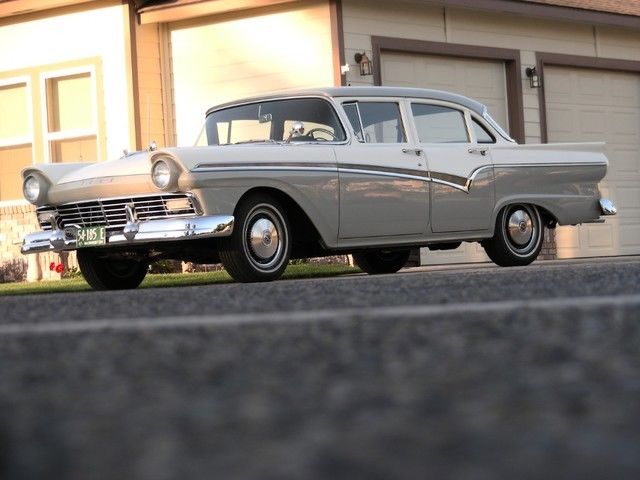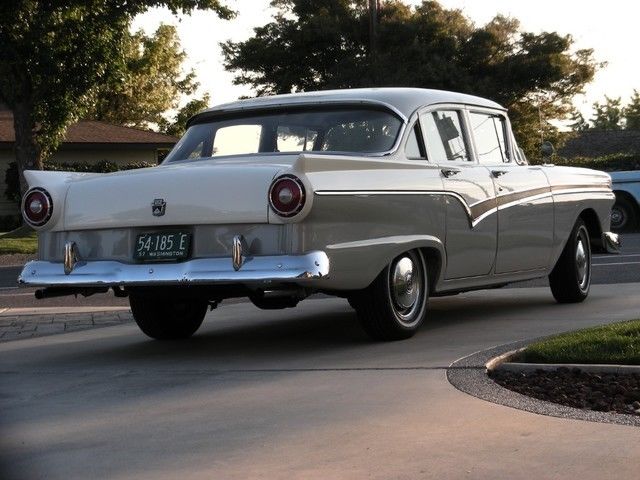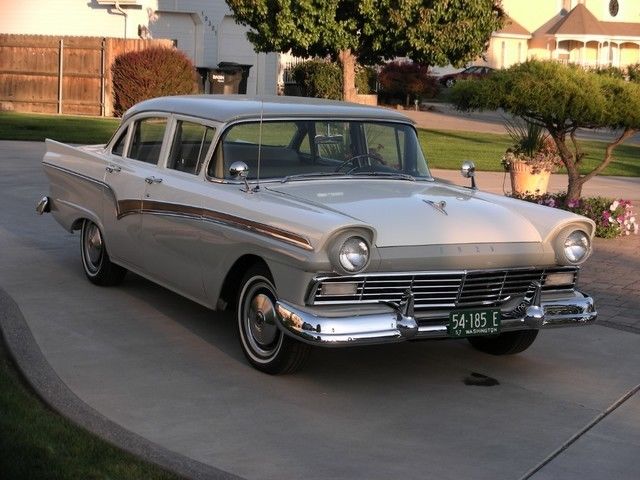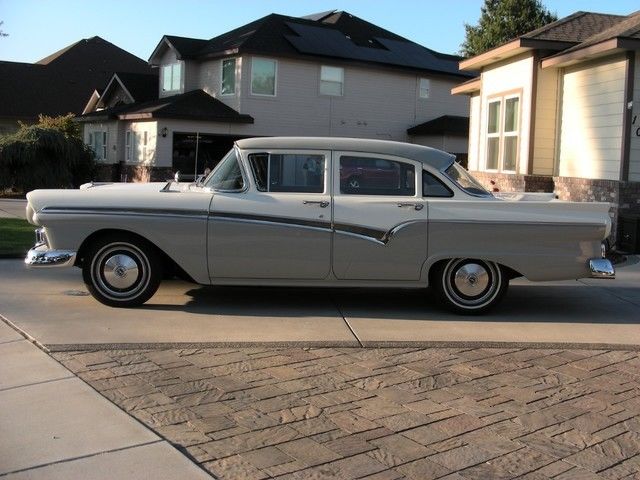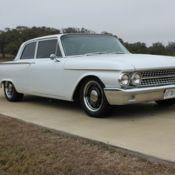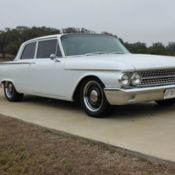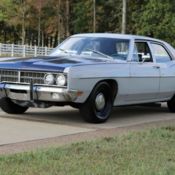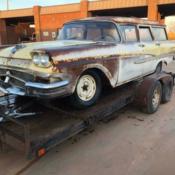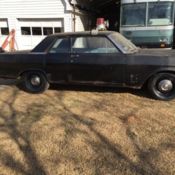1957 FORD CUSTOM 300 4Dr Sedan - Interceptor V8
Technical specifications of Ford Other 1957
| Price: | - |
|---|---|
| Condition: | Used |
| Item location: | College Place, Washington, United States |
| Make: | Ford |
| Model: | Other |
| Type: | Sedan |
| Doors: | 4 |
| Year: | 1957 |
| Mileage: | 86861 |
| VIN: | D7LG123313 |
| Color: | White |
| Engine size: | 8 |
| Fuel: | Gas |
| Transmission: | Manual |
| Drivetrain: | Rear Wheel Drive |
| Interior color: | Gray |
| Vehicle Title: | Clear |
| You are interested? | Contact the seller! |
Description
1957 Ford Custom 300
AUTOCHOICE Is Yours Dot com, LLC, is always very proud to represent cars/trucks/motor coaches that are over the top as you will find in this classic. This 1957 Ford Custom 300 isn't what you say to be themost desirable collectors piece out there, but it certainly is the most carefully put together and restored vehicle on the planet. No word to describe how well this one owner car was restored. Your careful attention to the enclosed photos will show this. Everywhere you look just oozes of originality with only two exceptions. !. The wheels and tires had to be switched out from 14" to 15" do to the space needed to convert from drum brakes to disc on all four. This makes for an exceptional handling car AND oh one more item, the AC is aftermarket installed during restoration. Now, you can not fault this, can you? On the down side depending on what the car is bought for, a good driver or show car, it will never be a number one show car as a unmolested classic. However, it can be said it is the best 1957 Ford Custom 300 driver in the world, in this writers opinion. The hub cabs are original and can be used with the help of 14 to 15" chrome adapters. The new owner may have other ideas for wheels, Dr Dougis leaving that option up to the new owner.NOTE: About the hub caps, the owner decided to order the 15" hub caps (cost of almost $500) and WOW does it make a difference, IMO. The Owner is motivated, don't be bashful to make and offer.As you can see, ALL, and I mean all parts are original, if the chrome was bad, dented, or rusty looking, they replaced with OEM parts. By the way, rust, NEVER had it. The car never resided in that type of climate that invited rust to live. We encourage yourquestions about this fine classic at any time. Again, we are proud to be able to represent this car and look forward to meeting the new owner of this excellentrestored classic. Call Don to day at (509) 301-1498, a good number for those International prospects.On a personal note from the owner, son of the father who bought the car in Dec, 1956. Dr. Doug, I call him, said of his father, "he was economical and practical and wanted a six cylinder engine with a stick shift. His uncle, who then owned the local Ford store said of his father, Walter, that car is too heavy, it needs a V8, I'm going to order a Police Interceptor V8 for him" and he did. Dr Doug learned to drive this car and when the family was done with it, he inherited the car. This has been hard for Dr. Doug to part with this family treasure. But had to be done. He is hoping it will go to a worthy family that will take good care of it. We at AUTOCHOICE do too!NOTE: If you would like to be able to blow up the photo's for closer study, just call Don and request the Dropbox version. Also, for your education and convenience, please find below a full blown history of this Ford Custom 300 Classic. 1957 Ford.From Wikipedia, the free encyclopediaThe mainstream Ford line of cars grew substantially larger for 1957, a model which lasted through 1959. The Crown Victoria with its flashy chrome "basket handle" was no more, and the acrylic glass-roofed Crown Victoria Skyliner was replaced by a new model, the retracting-roof hardtop Skyliner.
The new chassis allowed the floor to be placed much lower, which in turn led to a lower and longer look overall. The major component of this chassis was a differential whose pinion gear was exceptionally low relative to the axleshafts, lower than in conventional hypoid differentials.
957[edit]The 1957 models retained a single-headlight front end like their predecessors, but were unmistakable with their long flanks and tailfins. A plethora of trim lines was introduced, starting with the base "Custom", "Custom 300", "Fairlane", and top-line "Fairlane 500". The two Custom lines used a 116in (2946mm) wheelbase, while the Fairlanes had 118in (2997mm) between the wheels. A new car/pickup truck hybrid based on the short-wheelbase chassis was also introduced, the Ranchero.
The 223CID (3.7L) OHV Straight-6 continued, now with 144hp (107kW). The V8 lineup included a 272CID (4.5L) Y-block making 190hp (142kW), a 292CID (4.8L) Thunderbirdversion making 212hp (158kW), a 312 cubic inch V8 making 245 HP and a supercharged 312CID (5.1L) Thunderbird Special making 300hp (224kW), and designated "Police Interceptor" on the glove box. A dual 4 barrel version of the naturally. aspirated (non-supercharged) 312 cubic inch V8 rated at 270 HP (some sources report 285 HP) was reportedly available, although that engine option was not listed in most Ford sedan factory literature and is more commonly associated with one of the optional Thunderbird engines. This option was dubbed "E code" and featured a unique camshaft, cylinder heads, intake manifold and various other performance enhancements. It came standard with the deep-dish steering wheel. The radio became transistorized.[4] There were lights for the generator and oil instead of gauges.[5] The controls became reccesed for more safety (the Lifeguard safety package was still available)[6]
A new frame was used for the 1957 Fords. It moved to perimeter rails out, so that they would fully envelope the passengers.[7]
In a survey of 1957 Ford owners in the March, 1957 issue of Popular Mechanics, only 6.2% of owners ordered seat belts.[8]
This model was very successful, being the best selling car in America, overtaking arch rival Chevrolet for the first time since 1935. [9]
1957 Ford Fairlane 500 Club Victoria
1957 Ford Country Sedan
1957 Ford Custom RancheroA STORY ABOUT THE 57 INTERCEPTOR V8
1957 Ford Police Interceptor(LINK)http://autoroundup.com/index.php/1957-ford-police-interceptor/Q: Hi Greg, I have a question about the 1957 Ford Police Interceptor. I’ve just started reading your articles. I live in Coeur d Alene, Idaho, and was reading about Herb Wederman’s ’57 Fairlane 500.
When I was growing up I lived in Southern California in the city of Arcadia. On Friday and Saturday nights we would cruise Pasadena, mostly Colorado Blvd. At the time my dad had a ’57 Ford business coupe, and it was a 2-door with the center post and no frills. It was one real sleeper!
My dad said it had a 270 Police Interceptor engine in it with two 4-barrel carbs and a 3 speed transmission on the column. Sometimes he would let me drive it on the weekends, and we tore up Colorado Blvd. (Glad we were never pulled over). I have no pictures or data on the car, but I was wondering if you could tell me something about it? How long were they around, how many were in regular passenger cars?
Thanks for your help, Len.
A: Len, there’s good reason you can’t find much on the Police Interceptor in literature from that era. Similar to the Chevrolet Z-11 option in 1963 and the L-88 Corvettes in 67-69, Ford didn’t promote this engine or even offer it as an option unless you knew ahead of time you could order one in the 116-inch wheelbase ’57 Business Coupe. Evidentially, your dad did.
The Police Interceptor “E-Code” option included the dual 4-barrels on the Thunderbird 312 engine. The engine was rated conservatively at 270 horses thanks to an aggressive cam, better breathing cylinder heads, solid lifters, bigger valves and stronger connecting rods and crank. Additionally, a “Racing” version was also available, featuring an Isky E-2 flat tappet camshaft and lifters with a longer duration and dual valve springs. This Isky Cams setup pushed the horsepower up to 285. (Maybe your dad had this one?)
This special Police Interceptor engine came as a result of then Ford chief Robert McNamara, who pushed for better NASCAR racing engines to compete with Chevy and Chrysler, thus hurrying the special engine into production. However, because all of the 1957 Ford family literature had already been printed, the engine option isn’t listed in most all of the already printed ’57 Ford coupe and sedan literature. However, it does appear as an option for the ’57 Thunderbird.
When NASCAR outlawed dual carburetors for its race cars, Ford quickly eliminated the dual 4-barrel engines from the Fords and Mercurys, and no dual 4-barrel engine appearing on the option list in 1958. It wasn’t until 1962 when the 406 engine became available with dual quads that the option came back, this time for enhanced performance on the nation’s dragstrips. This engine would grow into the 427, which dominated many a drag race and, with one 4-barrel, took a top five at Daytona in 1963’s 500.
Today, a ’57 Ford 2-door post with the 312 dual fours is one of the top performance cars of the era and a welcome addition to any collector’s garage. Thanks for your letter.
(Greg Zyla is a syndicated auto columnist who welcomes reader questions at 116 Main St., Towanda, PA 18848 or email him at [email protected])For more articles, visit Auto Round-Up News online to view our archives at www.Auto-Roundup.com
